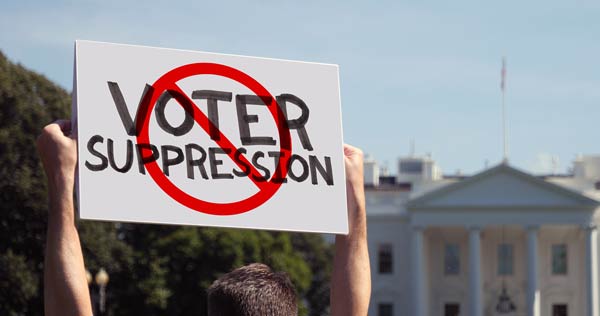Legal
Texas’s Proposed Voter Suppression Law

The threat to Texas voters of all political affiliations is not voter fraud but rather voter suppression.
David Weinberg
The following is adapted from testimony given Monday before the Texas House Select Committee on Constitutional Rights and Remedies for a hearing on Senate Bill 1.
All Texans deserve a free, fair, and accessible elections system. They registered and voted in record numbers in 2020, and they voted in an elections system that was safe and secure.
The idea that there is widespread voter fraud or problems in Texas elections is dangerous, racist, and moreover, it is devoid of evidentiary support. In 2020, Texas Attorney General Ken Paxton’s office spent 22,000 hours looking for voter fraud and uncovered just 16 cases of false addresses on registration forms out of nearly 17 million registered voters according to news reports.
Looking back, in the 10 years preceding the enactment of Texas’s voter ID requirements, only two cases of in-person voter impersonation fraud were prosecuted to a conviction. Again, to put it plainly and simply: the 2020 Texas election and past Texas elections were accurate and secure. This sentiment has been stated by Keith Ingram, director of the Elections Division for the Texas secretary of state. Ingram testified in the Texas House Elections Committee, “In spite of all the circumstances, Texas had an election that was smooth and secure. Texans can be justifiably proud of the hard work and creativity shown by local county elections officials.”
The clear and present threat to Texas voters of all political affiliations is not voter fraud, but rather voter suppression.
An analysis of state voting laws by Northern Illinois University and Jacksonville University concluded that it is harder to cast a ballot in Texas than in any other state across the country. Texas already severely limits those who may vote by mail, makes voters pay their own postage if voting by mail, and limits online voter registration to a limited category of voters. It also imposes onerous requirements on any citizen who wishes to register voters and requires voters to register 30 days before the election in which they want to vote, tied for earliest in the country.
But while participation should be welcome in a democracy, Texas lawmakers are considering a bill that would erect obstacles to the vote, Senate Bill 1. If the facts tell us anything, Texas politicians would do best to act reasonably instead: stop the alarmism and respect Texans’ access to the ballot.
Many Texas elected officials have been saying that Texas needs an elections bill that would make it “easier to vote and harder to cheat.” But the measures contained in this bill appear to be not a reaction to real incidences of cheating, but rather a fairly obvious reaction to and retaliation against successful efforts by local officials to make it safer for individuals to vote during a deadly pandemic, and by others to encourage voter participation. Senate Bill 1 makes voting and voter participation more arduous in a plethora of ways.
Senate Bill 1 would, among other measures, ban drive-thru and 24-hour voting, curb early voting, make it more difficult for voters with disabilities or language access needs to receive assistance with voting, prohibit election officials from sending mail ballot applications to eligible voters, and require mail ballot applications to be hand-signed and to include ID information. It would also make it harder for election officials and election judges to protect voters from poll watcher harassment, create a vague criminal penalty against “vote harvesting” that could capture ordinary interactions between campaigns and voters, and make it more difficult for Texas judges to accommodate voters in the event of a natural disaster or pandemic by restricting their ability to modify or suspend election procedures.
While Senate Bill 1 would impose restrictions on all Texan voters’ access to the ballot, the bill would appear to particularly impact voters of color. Limitations on voter assistance for people with limited English proficiency will have an outsized effect on communities of color. So will provisions that give great leeway to poll watchers to intimidate voters. And the apparent retaliation in Senate Bill 1 against election officials trying to make voting easier in large, diverse populations such as Harris County could not be more obvious. This coincides with new census data showing Texas continuing to grow into a more racially and ethnically diverse state.
Given the calamitous state of Covid-19 in Texas, with hospital systems stretched to their limits, certain portions of Senate Bill 1 that may require an individual to vote indoors or discourage an individual from engaging in contactless voting appear not only unnecessary but also grossly irresponsible. The entirety of Senate Bill 1 is unnecessary given the many false justifications for the bill — enacting provisions now to discourage voters from using drive through voting, vote by mail, or drop boxes seems beyond the pale and a dark stain on this institution.
Senate Bill 1 is a roadmap for making it more onerous for Texans to vote. It is a solution in search of a problem that exists only in the harmful rhetoric of those who continue to spread misinformation about the 2020 election and other elections.
In Texas, it is past time for lawmakers to leave divisive falsehoods behind and turn their attention to ensuring all Texas voters have fair, free, and equal access to the ballot box moving forward.


